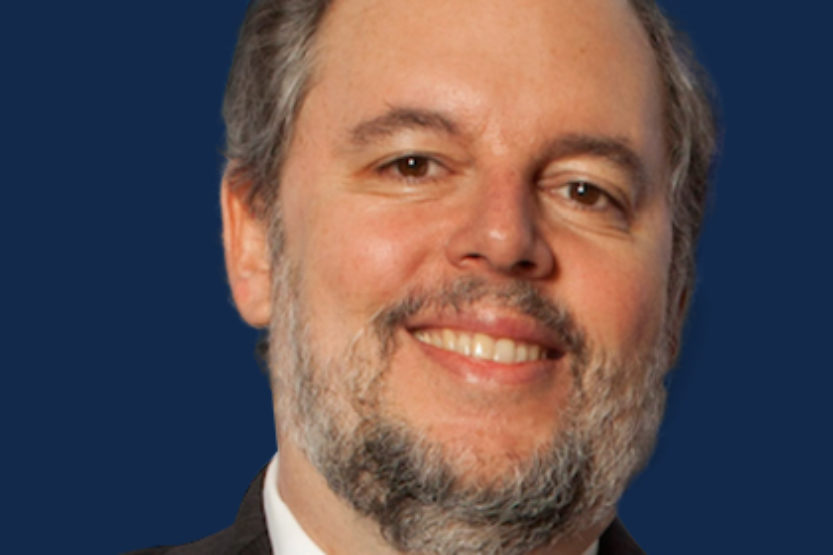2017 Alumni Award recipient, Stephen Elledge, ’78 LAS
 (Photo courtesy of Stephen Elledge)
(Photo courtesy of Stephen Elledge) Groundbreaker
Geneticist Stephen Elledge, ’78 LAS, is best known for a discovery that has helped doctors and scientists better understand the impact of chromosomes on cancer. But when he embarked on his scientific career at Illinois, he didn’t have designs on changing the world—he just thought science was really fun.
As a kid in the tiny town of Paris, Ill., he loved playing with his chemistry set. As a high-schooler, he won a regional science competition, an experience that helped steer him toward Illinois, where he became the first member of his family to attend college. He promptly dropped his practical major in chemical engineering in favor of chemistry, drawn by the discipline’s theory, experimentation and exploration. In his senior year, he found his future passion in a biochemistry class on recombinant DNA—artificially created DNA formed by fusing two or more gene sequences.
“That day was an amazing epiphany,” Elledge recalls. “I had never been into biology before. It had always seemed like soft science to me.”
Dropping his plans to work as a commercial chemist after graduation, he decided instead to pursue a doctorate in biology at the Massachusetts Institute of Technology. There, “I ended up in a bacterial genetics lab, and I just fell in love,” he says. He also realized biology wasn’t as “soft” as he had thought—and that he was woefully behind in the subject. To catch up, he took 10 full-semester biology courses in a single year. Afterward, he began working on recombinant DNA. Elledge published prolifically and invented a new way to clone bacterial genes.
High-risk experiments
Elledge then set out for Stanford University where he undertook postdoctoral research in the laboratory of Ron Davis. A fellow native of small-town central Illinois, Davis was working on plant genetics. Elledge soon found a kindred spirit in his new mentor.
As they collaborated, Elledge began to follow Davis’ example. He focused his work on yeast and undertook a series of high-risk experiments aimed at cloning and isolating bacterial and yeast genes. His first major breakthrough came as the result of a failed experiment on DNA synthesis. While revisiting his notes, he made an unexpected observation.
“There was this enzyme involved in DNA synthesis, and I saw that if you damaged the cell where the enzyme resided, the cell made a ton more of it,” Elledge recalls. “The cell clearly thought it was something you needed in order to help DNA synthesis go forward. And I thought ‘Gee, that must mean that there is some sort of pathway that sends a signal when you interfere with DNA replication.’”
Elledge’s discovery of the DNA damage-response pathway guided the next several years of his research, an era during which he left Stanford for a faculty post at Baylor College of Medicine in Houston. There he began to experiment with mammalian genes as well as yeast. One experiment led to the cloning of a mutant mammalian gene, a surprise development that led him into the study of cancer.
In 2003, Elledge took a position on the Harvard Medical School faculty, along with his wife and fellow scientist, Mitzi Kuroda, and his research partner, biochemist Wade Harper. As part of the transition, Elledge shifted his research in a new and profound way.
Going translational
“I made a conscious decision to make my work much more translational—something that was closer to actually dealing with medical problems,” he says. “I thought that by focusing on things that were more medically relevant, it would be a way of giving back to society.”
Concentrating his full creativity and skill on work with mammalian cells, he focused on aneuploidy—the accumulation of surplus chromosomes in cancer cells. He found that the extra chromosomes were not simply an indicator of cancer, but had their own negative impact. “Too many chromosomes,” he says, “impair the ability of the immune system to detect the [affected] cells.” He developed a mathematical model that could predict the presence and extent of aneuploidy in tumors.
The model, Elledge believes, is an important contribution to understanding cancer. His other innovations include the development of novel therapeutic strategies and immunological tools, including VirScan, a test that allows researchers to screen an individual’s history of viral infection using a single drop of blood.
His research has led to a host of a accolades and honors, including the National Academy of Sciences Award in Molecular Biology.

